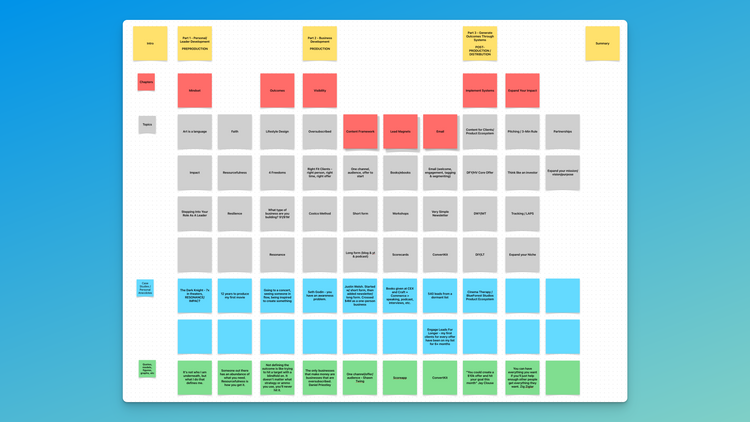You need a vision for the future of your business

This chapter came about unexpectedly, from having conversations and calls with early "beta" readers who were willing to share their stories and their struggles.
A common frustration was that they didn't know how to keep going when things felt so small and insignificant.
Without the early signs of success - a big email list, lots of responses to their content, etc - it was a struggle to stay motivated.
A second question was also asked - how do I deal with the tension of not wanting to do my work for money, but simultaneously needing money to survive?
The answer to both of these frustrations is vision.
In this chapter, I'll explain why you as the business owner need to have a vision for yourself and your business that can inform and give context to the work you're doing today so that you succeed in the future.
First, let's define vision. From the book Beyond Entrepreneurship 2.0, here's how Jim Collins defines vision:
Vision is what you put in place that encompasses your beliefs & values, your purpose, and your mission
Depending on who you're listening to, the terms Vision, Purpose, and Mission can start to blend, but we want to clarify how they are different.
Your vision is the grand, overarching plan that you have for yourself and your business. What you want it to become, who you want it to serve.
Your purpose is the reason that you care about realizing your vision.
And your mission is your current plan on how to get there.
Your vision will rarely change, which is why it is so important to come up with one at the beginning rather than letting one be decided for you (or avoided altogether).
Your purpose may slightly change the further you get into your business and as your audience's needs grow and evolve.
Your mission may change regularly, every year or so.
Beyond that, you have strategies and tactics that aren't part of your vision but support the attainment of it.
Most businesses focus on strategies and tactics, and that's why they end up failing in the long term.
Anyone who built their business on Facebook years ago had a rude awakening when the platform decided to start charging creators to reach their audience.
That strategy was faulty, and unsustainable because it wasn't fully in their control.
Those that survived, however, did so because they had a greater vision, and were able to adjust their strategy accordingly when that change occurred.
Your vision will inform the work you do for the time that you're working on your business. It should empower you, motivate you, and pull you out of bed each day because of how exciting it is.
Once you have a vision in place, everything becomes easier, because now you have a new context around the work that you're doing that today may feel insignificant or unimpactful.
With that definition in place, it's easy to see the risk of not having a vision.
Without a vision, you risk going down a path that leads AWAY from the future you want for yourself and your business. You could spend your time on projects that get you no closer to what you really want, so they feel like a wasted effort, at best, and a failure at worst.
How to create a vision for your business
You need to DEFINE a vision, write it down, and remind yourself every day what that vision is.
When I started doing this it was after reading the book Think & Grow Rich. I wrote down my vision for the future and have read it every morning and night since then.
In practice, what that looks like is imagining the dream future you want for yourself and your business. Get granular! Write down every detail you can think of.
If you're taking this seriously - and I hope you are - carve out an hour of your time in your calendar where you can be alone with your thoughts.
Get into a good mindset for this process. Turn off distractions, close the door, and don't let yourself be interrupted.
Then, start writing. What do you really want? Who do you want to serve? What do you want to be spending your time doing each day? How much money do you want to make? How big is your business? How much money do you make?
Write these answers and thoughts in the present tense, as if you've already achieved them.
Instead of "I will make $100,000 a year", change it to "I make $100,000 per year..."
Write write write until you can't think of anything else. Don't worry about how feasible or realistic these dreams are. This is your vision for the future and you have NO idea how the future is going to play out.
The only limitations are the ones you put on yourself, so don't put any limitations on your dreams!
Once you've done that, go through and pull out the parts that really give you an emotional response. They make you smile, they get your heart racing, they give you new ideas and excitement.
Write those into a new document that you can read every morning and night.
That's the process to create and then realize your vision.
What I've experienced from this exact process has been incredible.
This book came from that process because my mind knew that in order to realize the vision of helping 100,000 creators build more resilient, profitable businesses, I needed a vehicle to help with awareness and to get people to join me in the work.
I also clarified the type of film & TV producer I want to be, so that I am fulfilled in my creative work and can contribute to the industry and the people I get to work with.
The focus I got from clarifying my vision means that I'm able to say no to other jobs doing things that don't align with that. I've since been able to increase my prices because of how focused I've been.
Without that focus, that vision, I would have taken any job which would have distracted me from the work I wanted to do. I also left a good-paying gig on the TV show I was working on because it didn't fit my vision any longer, which opened up space for me to work on Craftsman Creative and other film & TV projects.
Your vision informs your work today
Returning to the struggle of not knowing how to keep doing the work that seems insignificant today.
With a bigger vision, the work you do today doesn't have to perform. You don't need 1,000 views or tons of responses to the thing you create today because it's not meant to perform independently of the other work you're producing.
Your vision allows your work to compound because it's now part of a bigger picture.
That blog post that you wrote a year ago becomes a chapter of a book that becomes the basis of a lesson in a course or a foundational part of your coaching and consulting practice.
That one blog post that didn't get any comments or likes the day it was posted may one day be responsible for thousands of dollars of income.
A personal example where I experienced this same struggle to stay motivated with writing every day.
At the end of 2020, I started a "60-Day Project" with the goal of starting a new blog and adding 60 new posts in 60 days.
(I know, what was I thinking?!)
Despite starting a new blog and writing 30+ posts in 2 months, I felt like I'd failed because I didn't write 60, and only had about 2,000 people visit the site in those two months.
I gave up too early and never returned to the project.
I'll never know what could have come from it if I'd kept up the habit and continued writing, despite not hitting my goal of 60 posts in 60 days.
But, compared that project to this book project.
The goal is to write a book in public, which means 30+ chapters in 100 days, tweeting about it every day using the #tweet100 hashtag, and having it as an important part of a bigger vision.
I want to help 100,000 creators grow their businesses. Some will make their first $1 doing what they love, some will double their already successful business, but most will learn what it takes to go from a five-figure creator to a six-figure business owner.
How?
It looks like this (more in the chapter on value ladder):
Tweets > Blog > Email/Newsletter > Book > Community > Coaching > Consulting
The first HALF of that vision is free content, but it makes the stuff that makes money ($XX book, $XXX community, $X,XXX coaching, $XX,XXX consulting/producing) work.
Without the entry point of the free content, like this book that's being written in public for free, it is much harder to sell the bigger ticket items that are a big part of the vision I have for this business.
The context gained from having a bigger vision has changed the dynamic of the work.
It's essentially the same as before, writing 1,000-2,000 words a day and publishing them on the internet, but what felt like a task before now feels like I'm being pulled out of bed each day with excitement to contribute to the incredible audience that's giving me their time and attention to read what I'm writing.
How could I NOT write every day?!
When expanded out over months and years, even if this book only leads to 100 new email subscribers, the content will inform the community, the coaching, and the consulting work I intend to do next year for the people that need it to reach their goals.
I'm not just writing every day for no reason. Rather, each post is a building block that I'm laying as part of the foundation for my future vision.
A year from now you could have a business, or another failed project given up on too early.
The only difference is the vision that is giving context to the work.
Remember, success is 80% mindset and only 20% strategy and skills.
Especially when the strategy is the same.
NEXT CHAPTER >

< PREVIOUS CHAPTER








Member discussion